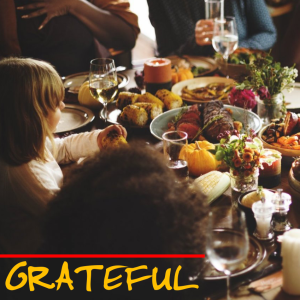Episodes

Sunday Dec 10, 2023
Sunday Dec 10, 2023
How can we say "It's a Wonderful Life" or "Merry Christmas" when we're in a season of suckiness? The movie and the Christmas story give us some hints that offer help when faced with sucky situations and suckmeisters.

Sunday Dec 03, 2023
Sunday Dec 03, 2023
There are similarities between the iconic Christmas movie and the birth narratives of Jesus. And, it turns out, the similarities extend to our own lives. There is gold here. And hope.

Sunday Nov 26, 2023
Sunday Nov 26, 2023
The natural response when filled with gratitude is to be gracious and giving toward others, to become more interested in others' well-being. When communities work together for the wellbeing of others, this necessarily becomes political, as shalom calls faithful communities to ensure shalom's development for everything, everyone, everywhere.

Sunday Nov 19, 2023
Sunday Nov 19, 2023
Feasting together is nothing new. Our ancient Jewish ancestors have been coming together for thousands of years to remember and reset their lives. Thanksgiving affords us the opportunity to do the same.

Sunday Nov 12, 2023
Sunday Nov 12, 2023
This week we focus on the decisions we make that help us cultivate a life of gratitude, even regarding difficult scenes from our past that we struggle to reconcile.

Sunday Nov 05, 2023
Sunday Nov 05, 2023
Gratitude improves our experience of life and even our physical wellbeing. Yet sometimes we struggle to be grateful. This talk help us sort out our gratitude feelings and offers some insight for the journey ahead.

Sunday Oct 29, 2023
Sunday Oct 29, 2023
The problem of evil is a significant reason many people leave the faith. The classic paradigm works for many, yet a growing number of people cannot accept a perspective that ultimately holds God responsible for the evil in the world that God could apparently thwart if desired. Open and Relational Theology offers another perspective that makes more sense. Don't throw out your faith; consider evolving your paradigm instead.

Sunday Oct 22, 2023
Sunday Oct 22, 2023
Synopsis. The heavens declare the goodness of God. Creation itself – from the smallest organisms to the expanding universe – are generative, life-supporting, and beautiful. Such a trajectory means that the guiding energy or force behind it is supportive, creative, faithful, reliable, consistent, generous, caring, and many other words that, taken together, simply boil down to one word: love. The Bible says that God is loving, so much so that it goes further to say that God is love. For those struggling to believe in a greater being, perhaps you can settle with the reverse of God is love: love is God. In light of the beautiful creation in which we live and the love of God that is energizing, guiding, and inhabiting it all, how are we to respond to such good news? Perhaps we should entrust our allegiance and our passion to following in the footsteps of Jesus who invited us to consider that such a giving of ourselves to what he was teaching would in fact save our lives. And perhaps not just our lives, but the lives of many others and the planet we call home.

Sunday Oct 15, 2023
Sunday Oct 15, 2023
This teaching features the perspective of three Process theologians: Marjorie Suchocki, Bruce Epperly, and Monica Coleman. Suchocki begins with an overview of prayer from a Process lens, followed by related thoughts from Epperly and Coleman. The latter two then address the question of praying for healing, specifically, offering their own "how to" approach.

Sunday Oct 08, 2023
Sunday Oct 08, 2023
The deconstruction and reconstruction process of faith – which we should expect to be an ongoing experience throughout our lives – can be extremely challenging at times. We may certainly wonder if God is even real. Such massive questions impact our confidence and interest in prayer. Sometimes we give up. Jesus instructs us to keep on praying, though, trusting in its efficacy. Could it be that when we least feel like praying is when we most need to pray?
